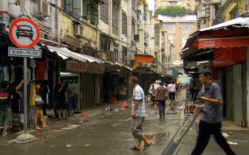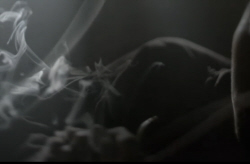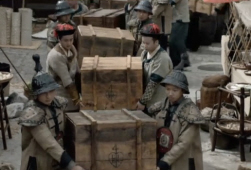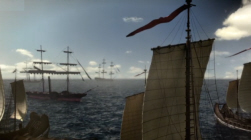Tea and Opium Trade, Britain and China
Britain wanted to do business with this Eastern giant. China’s 400 million people were a vast and lucrative market for British goods. And Britain’s new industrial middle class were eager to buy luxuries from China. But there was a problem. For 300 years, China had been closed off. It was self-sufficient. It didn’t need British goods. There was only one place that merchants from outside would come to get what they wanted, which was here, what they called Canton in those days.
And what British merchants wanted most of all was tea.

Tea had become the national drink. But it was a lot more than that. A 10th of all the British government’s tax revenues came from taxes on tea. That was enough to pay for half of the Royal Navy. So we had a nation of tea addicts and the government that had become addicted to tea taxes.
And the Chinese didn’t want to buy any British goods in return. All they’d accept as payment for tea was silver. Silver reserves were pouring out of Britain into China’s coffers.
There must surely be something else that the British could trade in return for tea?
There was. Opium. The Chinese had a taste for this highly addictive and illegal drug. And the British grew it in their imperial possession, India.

So there was a deal. We could smuggle in the dangerous drug, opium, and use it to pay for our benign drug, tea.
By the 1830s, the most successful drug pushers in the world weren’t Mexican bandits or Afghan warlords, but the British.
By March 1839, there were an estimated 12 million opium addicts in China. The Emperor sent one of his most trusted officials, the famously incorruptible High Commissioner Lin, to Canton. He began a thorough search of the trading district, where the British merchants were smuggling opium into China. All pushers were to be sentenced to death. Foreigners by beheading, Chinese by strangling.

Lin demanded that the British hand over all their opium supplies. When they refused, he locked down the trading district. Lin was ruthless. No food was allowed in. 500 troops were drilled up and down outside the windows, and huge gongs were sounded all night.
After 24 hours of sleep deprivation, the British surrendered. The merchants handed over 20,000 chests of opium, worth more than £160 million in today’s money. Lin destroyed it all.
Lin was triumphant, but he’d fatally misunderstood his enemy. He had no idea how important this trade was. Selling Indian opium for Chinese tea was one of the most lucrative deals Britain’s Empire traders had. They weren’t going to let it slip through their fingers. Two great empires were now on collision course.

The Chinese fleet of wooden-built junks was confronted by Britain’s new weapon of the industrial age, the world’s first ironclad battleship. The Nemesis.
The British blockaded the Pearl River and then sailed up the coast bombarding and seizing the major towns. On land, a Chinese army with bows and arrows and spears and muskets were mown down. Over two years, China was bludgeoned into submission.

The Chinese had no choice but to open up to British trade. The terms where humiliating. China was forced to pay the equivalent of £2 billion in today’s money for the lost opium, and to pay for the war against them. Five Chinese ports were forced to open to British traders. Oh, and Hong Kong was thrown in as part of the deal - a British colony on China’s doorstep.
China had been forced at gunpoint to open herself up to the modern global economy. The message was clear - industrialisation could transform a tiny country like Britain into a world superpower.
To ignore this was to be doomed to the status of a second-class nation.
